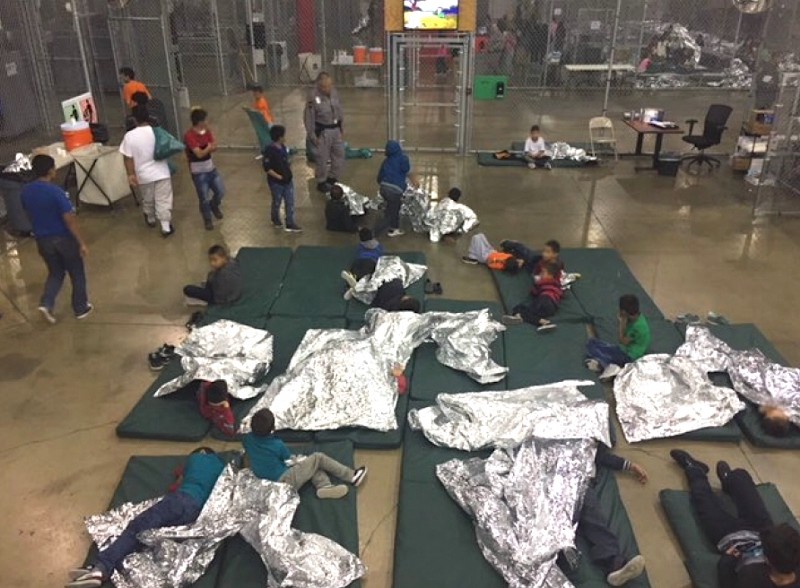Two defining features of the Trump presidency are conflict and chaos. From the moment he took the oath of office, waves of criticism followed him wherever he went. Now, as the House begins to build a potential case for impeachment, political discourse will only become more strained, taking a toll on the American people.
Take Kimberly Allen, 67, from Takoma Park, Maryland, a retired strategic planning officer for the Law Library of Congress. She can’t sleep, and she finds herself prone to bouts of anxiety and uncontrollable tears of frustration. She’s now taking blood pressure medication after a lifetime of low-to-normal readings. She has to resist the urge to indulge in comfort foods, such as ice cream and chips. And, often, after finally falling asleep at 2 or 3 a.m., she can’t get out of bed in the morning.
She is convinced she knows exactly why all this is happening. She blames it on the president.
“Every day Trump does harm to people, animals, the environment, our relations with foreign nations,” she said. “I ask myself why anyone would want to make the world a worse place to live, to leave nothing for their children and grandchildren. I wake up each day wondering what fresh new horror is coming.” And the cycle continues. “Although I know it’s not healthy for me, the first thing I do is check the news,” Allen said.
Allen can take some comfort in knowing she’s not the only one whose body is rebelling against the current state of affairs. New research suggests that, since the 2016 election, politics has been making Americans physically and emotionally ill.
“Increasingly we are seeing things in moral and existential terms,” said Kevin Smith, the University of Nebraska-Lincoln political scientist who led the study. “If you look deep into politics right now, what you find is a very troubled heart and soul.”
The study, which appears in the journal PLOS ONE, does not declare President Trump the source of Americans’ physical ailments and emotional angst. But it does suggest that the 2016 election and its aftermath are likely responsible.
“It’s a reasonable supposition that a lot of the results we are seeing are being driven by the unusual politics we are experiencing under the Trump administration,” Smith said. The last two and a half years have seen the caging of children whose families seek asylum, rampant denial of climate change, apathy toward gun violence, the normalization of white supremacy, a Supreme Court justice accused of sexual assault, lying and abuses of power.

“We live in turbulent political times,” he said, adding that “people on the political left were more likely to report suffering the costs of politics.”
While other recent research has zeroed in on politics as a source of stress, this is believed to be the first study to investigate what the constant churn of political news might be doing collectively to our social, psychological — and, most strikingly, to our physical health.
“Some of the numbers were eye-popping to me,” Smith said. “One in five adults is losing sleep because of politics. One in 20 said it has led them to have suicidal thoughts. If our numbers are even remotely accurate, we are talking about tens of millions of people who say they are experiencing some serious physical and emotional symptoms right now related to political stresses.”
The study found that almost 40 percent of Americans say that politics is stressing them out, while nearly 12 percent believe that politics has hurt their physical well-being. One in three say that seeing news outlets endorse opinions opposite to their own has “driven them crazy.” A similar number admitted that conversations about political news had caused them to lose their tempers, while one in five said it had cost them friends.
While left-leaning study respondents were more likely to describe ill health, this doesn’t mean that Republicans generally are immune. Experts, for example, attribute the large number of GOP House members who have quit, retired or chosen to not seek reelection to Trumpian anxiety.
“Given the deep cultural and political divides, the large reach of social media and the nature and scope of the challenges we are facing, I’m not surprised that many Americans may be reporting health impacts and shorter tempers over the last few years,” said Christopher Borick, professor of political science and director of the Muhlenberg College Institute of Public Opinion, who was not affiliated with the study. “This cocktail of factors, along with the impact of the president’s seeming lack of interest and effort in trying to bridge divides, has created conditions that can literally keep Americans up at night, and in some cases cause more serious mental and physical health issues.”
Borick said that America endured earlier challenges — for example, the Watergate scandal in the 1970s — but he asserted that America’s system of checks and balances was stronger then. With Watergate, which implicated President Nixon in a massive cover-up scheme, Congress moved steadily toward impeachment with bipartisan support, including members of Nixon’s own party — although Nixon resigned before any impeachment votes occurred. It remains to be seen how Democrats’ potential impeachment inquiry will play out, but with the GOP in lockstep with Trump, Borick said, many Americans will feel helpless.

Norman Ornstein, a resident scholar at the American Enterprise Institute, a conservative Washington think tank, agreed, saying politics in general is more polarized than it was in 1970s.
“Now add in Trump — who is far worse in every respect than Nixon or any other president — fueling moves to autocracy, acting corruptly and filling the executive branch with thoroughly corrupt people, pursuing cruel policies and promoting bad governance,” said Ornstein, who also was not involved with the study. “No wonder people are anxious, stressed and unhappy to the point of becoming physically ill.”
To conduct the study, Smith and his colleagues — who included John Hibbing, also a political science professor at Nebraska, and Matthew Hibbing, associate professor of political science at the University of California, Merced — took self-diagnostic tools based on those used by Alcoholics Anonymous and Gamblers Anonymous and adapted them to politics, questioning 800 adults about their physical and mental health, behavior, lifestyle and social ties in March, 2017.
“This is one survey at one point in time,” Smith said, noting that they have no comparable data from the Obama administration. “I would be interested in doing this again when politics is dominated by a left-leaning administration. But the question that got us started on this study was: is there something different about politics today?”
Borick and others would almost certainly say yes.
“I receive lots of personal and anecdotal reports that align with the findings of this study, which was not the case during earlier periods in my 25 years in the field,” Borick said. “Individuals experiencing these stresses should seek support from professionals in coping with their health problems. More importantly, as a society, we need to think about how to repair and reverse the damage, and find ways to rebuild trust in our institutions.”
Marlene Cimons writes for Nexus Media, a syndicated newswire covering climate, energy, policy, art and culture.

